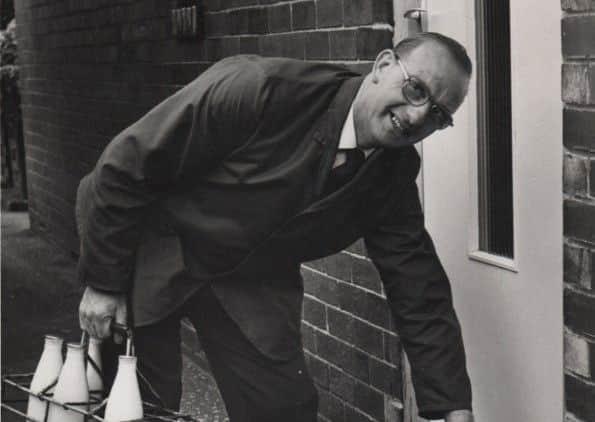The Nostalgia Column with Margaret Watson


This was the day he retired from the family milk business which his father and grandfather had run before him. It was the end of an era.
This week, at the age of 91, Ronnie writes about the days when milk and other commodities were delivered in the village by horse and cart. Here are some of his memories:
Advertisement
Hide AdAdvertisement
Hide Ad“In the 1930s, the main mode of transport in Hanging Heaton was horse-drawn because most local businesses couldn’t afford cars or vans.


“Both my grandfathers, Mark Bramley and Brandon Ellis, were dairymen and both had a horse and milk float for their deliveries.
“Granddad Bramley collected his milk from Elliot’s farm at Shaw Cross and Webbs, Kirkgate, while Granddad Ellis collected his from Bracewell Farm on Leeds Road.
“Local farmers milked cows by hand into pails which were then poured into a small tank situated above a water cooler. The milk would run through to cool, and then through sieves into 12 gallon churns.
Advertisement
Hide AdAdvertisement
Hide Ad“If customers were going out, they’d leave a jug or basin in their out-house or coal house with a saucer over it to keep out the dirt.


“We delivered twice daily and sometimes it was after 8pm when the horse was put in its stable or turned out to graze in the field.
“Gypsy Jack was a well known horse trader and our family always got a good horse from him.
“When our horse, Tommy, which had been with us many years,started to go lame, the vet said he’d be better doing a lighter job.
Advertisement
Hide AdAdvertisement
Hide Ad“Gipsy Jack said he’d put him out to graze and would take him in part exchange for a horse called Victor.
“He said Victor was very quiet and strong and would keep going all day, which he did without any problems.
“Until one day, while trotting along the road he suddenly put all four feet down and stopped dead, which caused my dad and Granddad Bramley to fall out of the milk cart into the road.
“They’d no idea why he’d done this, until old Benny, who hawked firewood on a flat cart pulled by an old donkey, came round the corner.
Advertisement
Hide AdAdvertisement
Hide Ad“Victor started shaking and sweating at the sight of the donkey and wouldn’t move till it was out of sight. It seemed that Victor could smell a donkey some way off.
“Afterwards, granddad kept a close watch on him but still kept him until 1937 when he bought a Ford 8 van for £105.
“Another trader, Harry Fox, had a beautiful chestnut shire horse to pull his coal cart to and from Shaw Cross Pit, the horse’s harness always shining and the brasses dazzling.
“Ralph Bancroft, from Commonside, owned a small pony which pulled a two-wheeled flat cart in summer, selling tripe and cow heel from a large box on top of his cart.
Advertisement
Hide AdAdvertisement
Hide Ad“In winter he’d head for Shaw Cross Pit to collect a cart load of briquettes which he sold round the village.
“Ralph was a character in his flat cap, riding breeches, boots and leggings, always smoking a pipe.
“Percy Clayton, from Batley Carr, came into the village every Tuesday with his shire horse and covered wagon, selling pots, pans, soap, clothes lines, dish cloths, firelighters, paraffin, and every kind of household goods.
“Oaklands, the other pot line hawker who came into Hanging Heaton, always had a smart turnout and the horse was always well looked after.
Advertisement
Hide AdAdvertisement
Hide Ad“Percy Wood, who had a house shop on Bromley Street, travelled around the area in his pony and trap selling the most beautiful ice cream.
“It was a rich cream colour and melted in your mouth.
“In winter he’d come round most evenings ringing his bell and selling home-made pork pies and hot mushy peas.
“Wilf Rogers sold all kinds of fish, rabbits and shellfish from his cart pulled by Dolly, his fiery mare.
“He always asked Dad to use Dolly to deliver our Sunday evening milk round just to calm her down for Monday mornings.
Advertisement
Hide AdAdvertisement
Hide Ad“Dolly had a real mean streak and once she got hold of my jacket with her teeth and tore it off my back. One day, while grazing in Granddad Ellis’s field, she kicked in Arthur Lodge’s hen hut door and got her nose into the corn inside.
“She ate nearly a hundredweight before someone saw her.
“When she was between the shafts of our milk float on her way home on Sunday evenings, it was like riding in a chariot.
“Dad used to judge the traffic lights at the bottom of Town Street to perfection.
“As soon as they changed to green, he cracked the whip and Dolly was off like a bullet and didn’t slow down until she was at the railway station.
Advertisement
Hide AdAdvertisement
Hide Ad“The following Monday when Wilf used Dolly to collect his fish, she was quite docile and easy to handle.
“Jimmy Schofield, from Low Bottoms, off High Street, used a horse and flat cart to deliver wet fish.
“Fred Schofield had a house shop at the bottom of Kirkgate and delivered greengroceries all around the village.
“At Whitsuntide it was a joy to see a horse pulling a four-wheeled cart, decorated with colourful banners and bunting, carrying the local Church of England or Methodist Sunday Schoolchildren, on the annual walk and hymn sing round the village.
Advertisement
Hide AdAdvertisement
Hide Ad“As a lad I saw the change over in our village from horse to motor transport, the plus side being no more walking up Caulms Wood armed with a rope halter and a crust of bread trying to catch a horse who didn’t fancy swapping a field of grass for a day’s work pulling a milk float.
“The minus part was pushing a van down the road on a winter’s morning when the battery was flat.
“Oh happy days!”
l The history of another Dewsbury village – Briestfield – and the surrounding area, will be the subject of an illustrated talk by John Lyte, a member of Briestfield History and Community Group, at Whitley Community Centre, on Thursday 19 April at 7.30pm. Everyone welcome. Light refreshments. Admission £2.